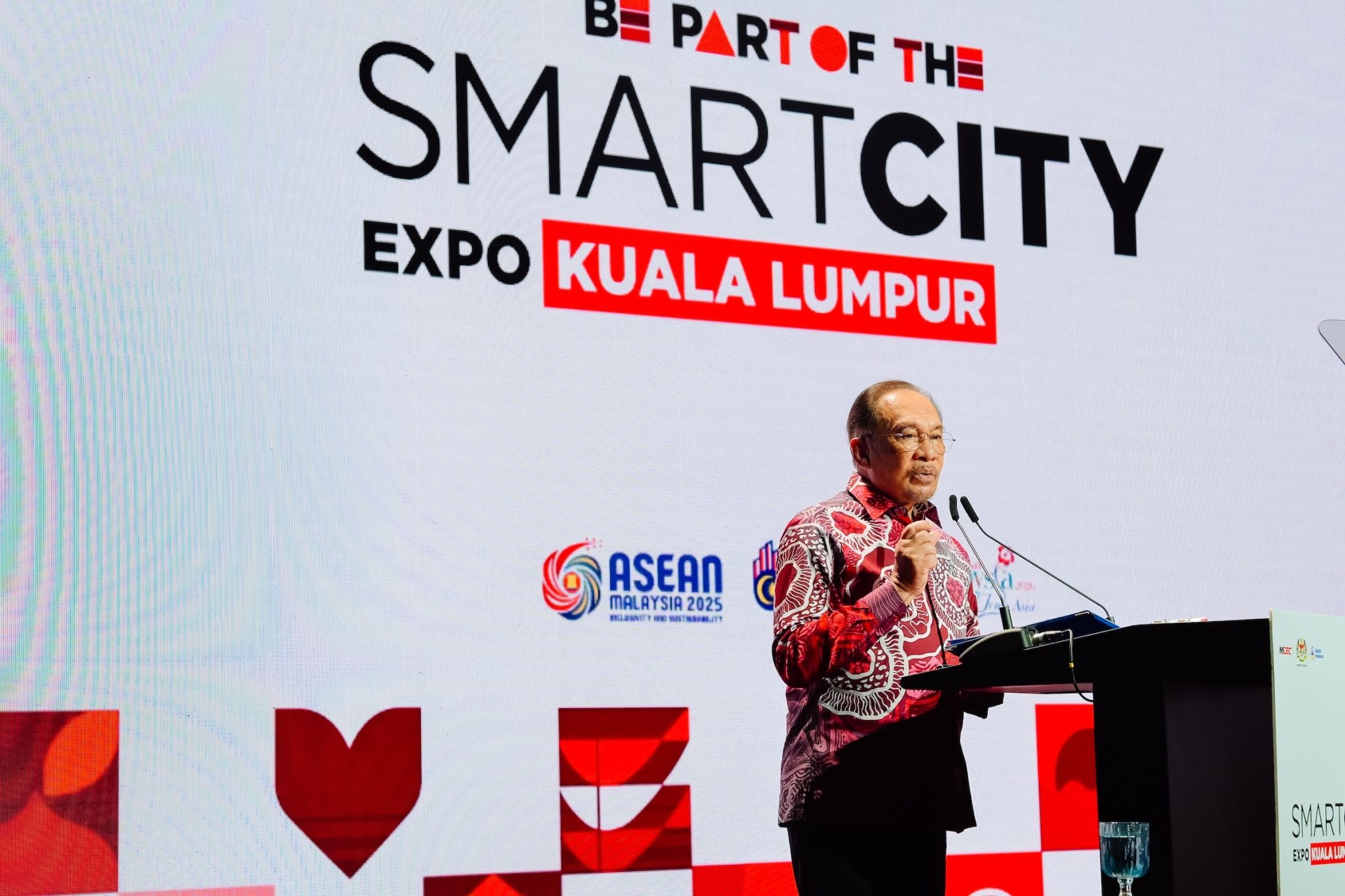[SCEKL25] AI cities must be empowered by local expertise, platforms and solutions, says Malaysia PM

Editor’s note: this article is written in partnership with MDEC.
AI cities must be empowered by local expertise, platforms and solutions, according to Malaysia Prime Minister Anwar Ibrahim.
“A city must be built for the people and serve its purpose and championed by our enterprises. AI cities must be empowered by local expertise, platforms and solutions. We must be proud to have solutions that reflect our unique needs and values,” he said in his speech at the opening ceremony of the Smart Cities Expo Kuala Lumpur (SCEKL).
By fostering innovation and supporting homegrown talent, we can reduce reliance on external technologies and ensure data sovereignty,” he added.
According to him, the target and aim of a smart city is to reduce cost and engage every single citizen, including the poorest, making it easier, cheaper and accessible.
The city must be living spaces that uplift living standards of the people, he said.
World Bank states that cities account for 80 percent of global GDP and 88 percent of global private sector job creation. Urbanization, however, raises the cost of living which is already pressured by supply chain disruptions, geopolitical events and energy and raw material costs. The phenomenon of urban poor is a symptom of underlying income inequality.
Exacerbated and unchecked urban poverty could setback Malaysia’s poverty eradication, the prime minister warned.
“Despite the pressure of an ever changing landscape, we must hold steadfast with the ethos of inclusivity and sustainability. We must decisively shape cities around people and address their concerns. I think these need to be stressed, because otherwise we are talking just about technology or level of technological sophistication or AI, but actually it relates to the common men and women,” Anwar added.
In an increasingly complex world, Anwar said cities face challenges arising from rapid population growth, diverse demographics, environmental issues and increasingly sophisticated infrastructure needs.
“This is where digital technologies such as AI offers us the tools to respond to these proactively,” he noted.
“From leveraging AI capabilities in energy, water, waste management to strengthening our national resilience with technology empowered disaster response, the Smart City bolsters cost efficiencies, decreases our environmental footprint and fortifies our cities to be better prepared for future perils.
“It is with these synergies that we could collectively enhance the citizen experience. AI empowered government services could increase accessibility, ensure consistency in responses, thus strengthening our commitment ultimately to justice, stability and safety,” he added.
Malaysia has built the foundation for this “Smart City” vision with world-class digital infrastructure. The nation’s 5G coverage have reached 82.4 percent of populated areas and with the 13th Malaysia Plan committing up to 98 percent of populated areas.
“Now, beyond high-speed conductivity, we are developing a deep pool of cloud resources via data centers across this country. This would be empowered by affordable compute power for Malaysia,” he added.
While prosperity is the purpose, innovation must be the cause. Ideas transfer in environments of close proximity, thus the rise of innovation hubs and districts that generate wealth.
“Yet as innovation in the digital age also comes hand in hand with demand for energy, our commitment to sustainable goals and 2030 agenda for sustainable development must be rigorous,” he said.
At the heart of it is the need to build spaces and enhance care and compassion while embedding trust.
“Now, our cities of the future must be constructed with the ‘MADANI’ principles that envisions a future with sustainable communities, equal opportunity and compassion,” he added.
While the envisioned Smart City can be a utopia of solutions, Anwar also noted that it presents challenges to cybersecurity, data management and privacy.
“Developing this vision could pit the ‘green corridors’ for ambulance and emergency services against potential critical infrastructure attacks, hyper-surveillance, extremely customized services and the vulnerabilities from interconnected systems. It may also mean physically transforming existing cities,” he said.
Anwar hence suggested the development of smaller scale sub cities instead of dealing with more established cities.
“New sub cities like Kota Madani in Putrajaya or probably a second proposal around Cheras. That could be done more effectively because we are not boxed by the old archive infrastructure,” he added.
Malaysia aspires to become an AI nation by 2030.
Featured photo credit: SCE KL
#SmartCities #AICities #UrbanInnovation #DigitalInclusion #DataSovereignty
- SmartCities
- AICities
- UrbanInnovation
- DigitalInclusion
- DataSovereignty
- If
- Ifvex
- Ifvex_AI
- Ifvex_Social_Network
- Ifvex_AI_Community
- Ifvex_Technology
- Artificial_Intelligence
- AI_Social_Network
- AI_Community
- AI_Networking
- AI_Collaboration
- AI_Innovation
- AI_Technology
- AI_Trends
- AI_Development
- AI_Tools
- AI_Platforms
- AI_Solutions
- AI_Integration
- Art
- Causes
- Crafts
- Dance
- Drinks
- Film
- Fitness
- Food
- Oyunlar
- Gardening
- Health
- Home
- Literature
- Music
- Networking
- Other
- Party
- Religion
- Shopping
- Sports
- Theater
- Wellness


